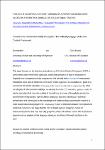Towards instrumental trainability in England? The ‘official pedagogy’ of the Core Content Framework
| dc.contributor.author | Hordern, J | |
| dc.contributor.author | Brooks, C | |
| dc.date.accessioned | 2023-09-21T18:16:46Z | |
| dc.date.available | 2023-09-21T18:16:46Z | |
| dc.date.issued | 2023-09-20 | |
| dc.identifier.issn | 1467-8527 | |
| dc.identifier.issn | 1467-8527 | |
| dc.identifier.uri | https://pearl.plymouth.ac.uk/handle/10026.1/21339 | |
| dc.description.abstract |
This paper focuses on the structure and substance of the Core Content Framework (CCF), a controversial document which stipulates content that providers of teacher education in England must incorporate in their programmes. We identify both a concept of instrumental trainability and a lack of coherence in the CCF which suggests it is unsuitable as a guide to a curriculum for teacher education. Drawing on Bernstein’s work and its application by other sociologists of educational knowledge, we identify how the CCF embeds a ‘generic mode’ in teacher education that has roots outside of disciplinary structures of knowledge production and therefore foregrounds a type of official pedagogy that sees teaching as a technical performance and leaves gaps in the knowledge and understanding a new teacher requires to make sound educational judgements. Employing Muller’s distinction between conceptual and contextual coherence, we argue that the CCF is based upon an imaginary notion of instructional practice that does not fully grasp the context of teachers’ work. We illustrate the argument via an analysis of the language, structure, and three of the eight sections in the CCF. | |
| dc.format.extent | 5-22 | |
| dc.language | en | |
| dc.publisher | Taylor and Francis Group | |
| dc.subject | teacher professionalism | |
| dc.subject | initial teacher education | |
| dc.subject | teacher education policy | |
| dc.subject | sociology of educational knowledge | |
| dc.title | Towards instrumental trainability in England? The ‘official pedagogy’ of the Core Content Framework | |
| dc.type | journal-article | |
| dc.type | Article | |
| plymouth.issue | 1 | |
| plymouth.volume | 72 | |
| plymouth.publisher-url | http://dx.doi.org/10.1080/00071005.2023.2255894 | |
| plymouth.publication-status | Published | |
| plymouth.journal | British Journal of Educational Studies | |
| dc.identifier.doi | 10.1080/00071005.2023.2255894 | |
| plymouth.organisational-group | |Plymouth | |
| plymouth.organisational-group | |Plymouth|Faculty of Arts, Humanities and Business | |
| plymouth.organisational-group | |Plymouth|REF 2021 Researchers by UoA | |
| plymouth.organisational-group | |Plymouth|Users by role | |
| plymouth.organisational-group | |Plymouth|Users by role|Academics | |
| plymouth.organisational-group | |Plymouth|REF 2021 Researchers by UoA|UoA23 Education | |
| dcterms.dateAccepted | 2023-09-01 | |
| dc.date.updated | 2023-09-21T18:16:46Z | |
| dc.rights.embargodate | 2023-9-23 | |
| dc.identifier.eissn | 1467-8527 | |
| dc.rights.embargoperiod | forever | |
| rioxxterms.versionofrecord | 10.1080/00071005.2023.2255894 |


